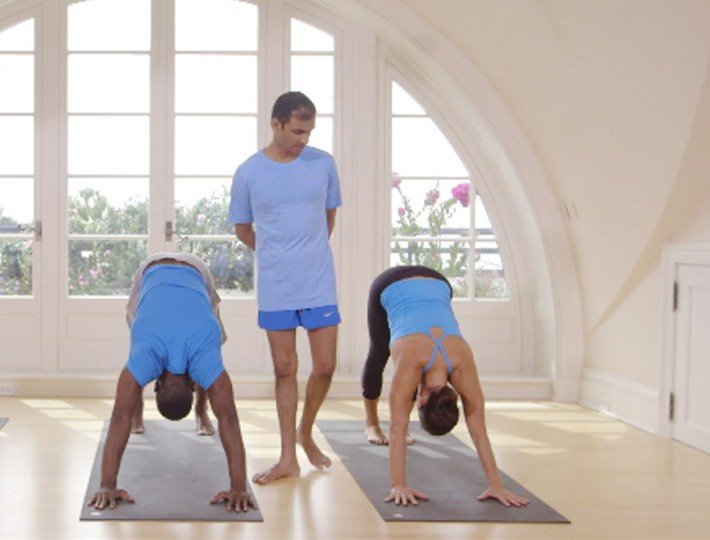For people of all ages, the idea that yoga can help us stay healthy and youthful longer is a powerful motivator for practice. The fundamental and most obvious benefits of yoga—increased flexibility, a calmer state of mind, and improved body awareness—counteract the natural declines in focus, agility, balance, and clarity that are often associated with growing older. Yoga’s positive results for heart disease and bone health have also been widely documented.
But the effect of yoga on age-related “symptoms” might be even more far-reaching than previously thought. An increasing body of research indicates that regular practice can impact mechanisms such as gene expression, cognitive function, and immune response, not to mention diseases ranging from cancer to Alzheimer’s.
Related: A 10-Minute Yoga Class for Beginners
“There are now studies starting to show the beneficial effects of long-term yoga and meditation practices on reducing age-related decline,” says Sat Bir S. Khalsa, a Harvard Medical School researcher who serves as research director for the Kripalu Institute for Extraordinary Living (KIEL). “The long-term implications of global implementation of yoga practices are a reduction in disease rates in the elderly, improvements in physical and cognitive performance, and hence quality of life.”
A Better Brain
One area that consistently suffers with age is the ability to cope with new and unexpected situations and engage in abstract thinking—what’s known as “fluid intelligence.” A study by a team of KIEL-affiliated researchers compared yoga and meditation practitioners between the ages of 40 and 70, with at least 20 years of practice under their belts, with control subjects of similar age and demographics. The team looked at the brain MRIs and fMRIs of 16 Kripalu Yoga practitioners, 16 vipassana meditators, and 15 controls who did not engage in any form of yoga or meditation.
“The results indicated that, as hypothesized, the long-term practice of yoga and meditation buffered against age-related decline,” says Angela Wilson, a Kripalu faculty member and former project leader for KIEL. “Both yogis and meditators had higher average scores on fluid intelligence tests than [those in the control group]. In addition, these two groups had higher scores on mindfulness questionnaires than controls. Additional studies could continue to tweeze out additional differences between groups, but these results indicate that the long-term practice of meditation and yoga protects cognitive abilities well into older age.”
Gene Expression
All the functions of the body are essentially coded in our DNA, Khalsa explains, but that doesn’t mean we have no control over them. “Your behavior, what you eat, the drugs you take, can all affect gene activity,” he says. “You can ‘up-regulate’ and ‘down-regulate’ your genes.” Healthy lifestyle choices like yoga practice can play a large part in how genes are expressed—and thus impact the disease process. Exactly how this works is still being explored, but Khalsa says good gene regulation—and many other benefits of yoga—can be traced back to yoga’s ability to increase the activity of the parasympathetic (rest and digest) nervous system and reduce sympathetic (fight-flight-freeze) nervous system activity. This comes with a concurrent reduction in cortisol (“the stress hormone”), which is known for producing all sorts of negative effects, from depression to osteoporosis. “[Yoga] is working at a molecular level, in the cells of our body,” Khalsa says.
Related: How Yoga Breathing Calms the Nervous System
In another study, 39 people with an average age of 60 either practiced Kirtan Kriya, a Kundalini yoga meditation, or listened to relaxation music for 12 minutes per day for eight weeks. (The group was limited to those who were caring for someone in the family with dementia, so their stress levels were relatively high.) The group practicing Kirtan Kriya showed not only lower levels of depressive symptoms and improved cognitive functioning, but also a decrease in inflammatory genes (which are indicators of disease) and a 44 percent increase in telomerase, the enzyme that controls the length of telomeres, the “cap” of DNA. According to Dharma Singh Khalsa, M.D., founding president and medical director for the Alzheimer’s Research and Prevention Foundation, “Longer telomeres equal better health. Shorter telomeres equal Alzheimer’s disease and accelerated aging and a shortened life.”
Building Immunity
Genetics and stress are directly related to immunity; yoga’s positive effects on both lead to improved immune function. A study done in Norway isolated the effects after just four days of yoga practice on participant’s immunity-related gene expression, and found significant increases in activity—about three times that of those who took relaxing walks in nature each day or listened to relaxing music. Findings like these are of particular significance for aging populations because the immune system becomes less powerful as we get older—as does its ability to detect and correct cell defects, which results in an increased risk of cancer.
So how long and how frequently do we need to practice yoga to get these health benefits? There’s no definitive answer—although research conducted by the University of Maryland Medical Center and the National Institutes of Health concluded that it’s how frequently you practice yoga, rather than how many years you’ve practiced, that determines the levels of well-being and relaxation you experience.
In other words, you’re never too old to start getting younger.












Comments (0)